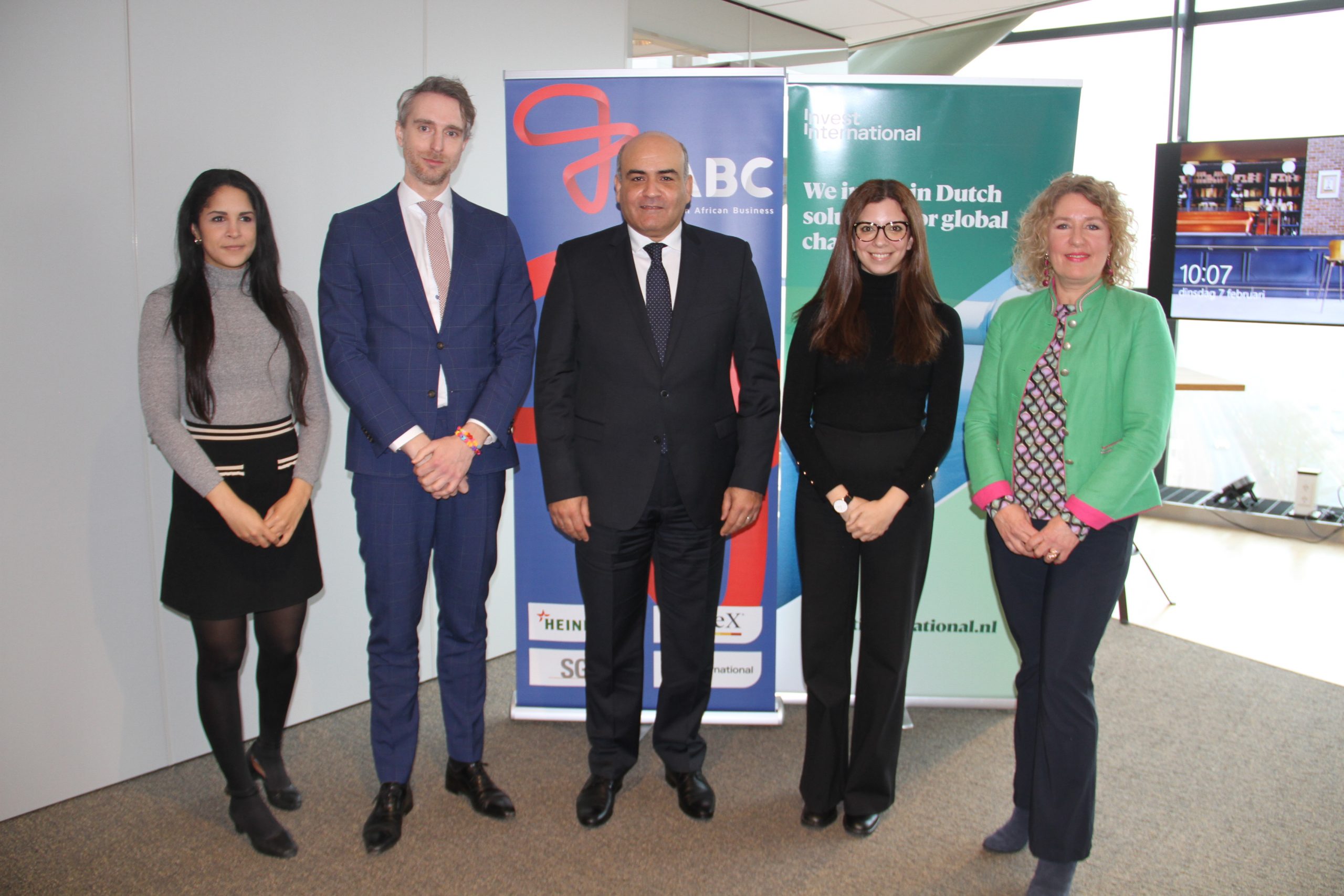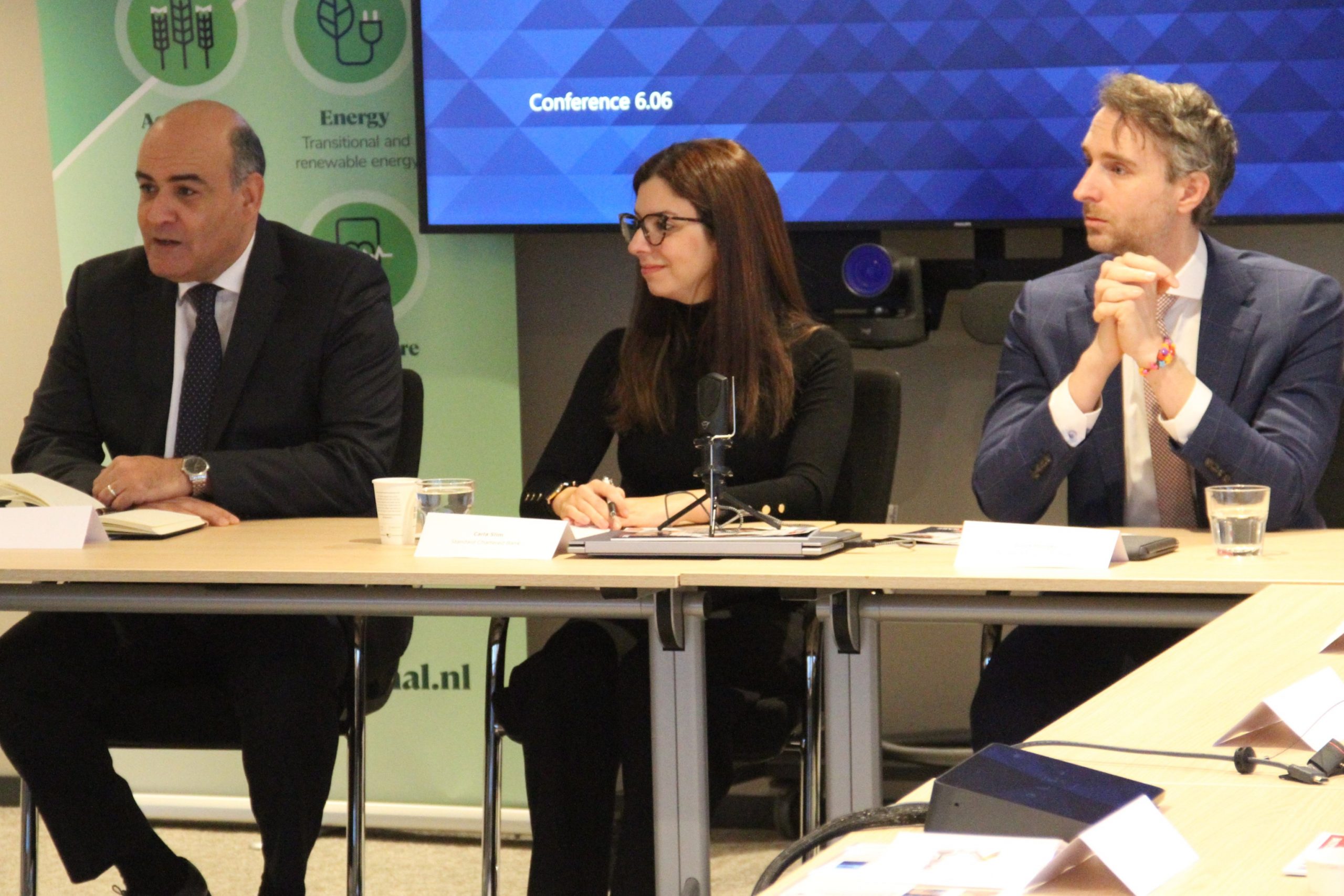Event Report: Africa Expert Breakfast on Egypt’s Stabilisation Efforts
In collaboration with the Standard Chartered Bank, VNO-NCW, and Invest International, the NABC held its first Africa Expert Breakfast round table on the 7th of January regarding Egypt’s stabilisation efforts and what results can be expected in 2023. The following article is a recap of Ms. Carla Slim’s presentation.

From left: Ms. Alexis Cousins (SCB), Mr. Guus Huijgen (SCB), H.E. Mr. Hatem Elsayed Kamaleldin (Embassy of the Arab Republic of Egypt), Ms. Carla Slim (SCB), and Ms. Rosmarijn Fens (NABC)
In collaboration with the Standard Chartered Bank, VNO-NCW, and Invest International, the NABC held its first Africa Expert Breakfast round table on the 7th of January regarding Egypt’s stabilisation efforts and what results can be expected in 2023. The Africa Expert Breakfast round table was opened by H.E. Mr. Hatem Elsayed Kamaleldin, the Ambassador of the Embassy of the Arab Republic of Egypt in The Hague and the expert of the session was Ms. Carla Slim, an Economist for MENAP at the Standard Chartered Bank. The following article is a recap of Ms. Slim’s presentation.
Introduction
Following close to 12 months of macroeconomic and FX challenges, the Egyptian pound (EGP) went through a third devaluation in less than a year in January. The IMF programme factors in continued financial support from the GCC, a recovery in portfolio inflows, and a substantial pick-up in foreign direct investment (FDI). However, what are the implications of these financial and macroeconomic developments on economic agents, particularly given the lingering FX backlog which continues to constitute an overhang on the EGP?
Global Outlook
On the global front, investors are convinced that they need to get the developed market macro outlook right for this to reflect accurately on the emerging markets outlook. This is especially important for emerging markets that are sensitive to influence, whether that be FDI or foreign investment portfolio influence. Regarding the Federal Reserves (FED) of Egypt, the Standard Chartered Bank remains optimistic with the expectation that the hike of 25 basis points (bp) at the beginning of February might be the last time the FED hikes their rates.
Due to Egypt’s Central Bank’s incorrectly forecasted inflation, the Bank will need to maintain higher interest rates for longer. That doesn’t mean that there will not be a cut but rather that the return to 0% interest rate environment should not be expected anytime soon. This is why emerging markets (EM) that typically are sensitive to influence and affluence will need to adjust to the current paradigm. It is expected that risk sentiment will become more positive towards EM. However, investors will be looking at markets that have differentiation and reward markets that have changed and reformed the most in order to cherry-pick the economies they wish to invest in the most.
Zooming in on Egypt
Egypt’s challenge is one of liquidity. If Ukraine had not happened, the EM sell-off would not have happened and capital markets would still function allowing Egypt to access its sources of liquidity. It is not that Egypt had an overarching vulnerability to wheat crisis, the concern of affordability was experienced to a similar level as in any other part of the world. However, the key differentiator was that Egypt had to face a USD20bn portfolio outflows in the short weeks following the Ukraine crisis. Yet, the Central Bank’s reserves totalled at USD 40/45bn meaning that half of the reserves had to be mobilised to be issued to investors on their way out. While all investors did manage to find their USD, something that will be remembered by the investors when they decide to bring back their portfolio (of which some have begun to do so in the last few weeks), it is clear that Egypt is in a need for differentiation of fund inflows.
Authorities have recognised this challenge and can be spotted in the IMF programme – while the inflow of foreign portfolio remains important, it is not the key driver of the inflows into the country.
Where are we now?
A lot has changed since last month. IMF approved a new programme in December totalling USD 3bn. The IMF programme supports the Egypt’s own reform programme, which aims to address vulnerabilities and promote sustainable and inclusive growth and job creation. While it is smaller when compared to other IMF loans, it must be noted that this is an addition to the already loaned sum of USD 20bn since 2016. IMF is very keen that the program addresses future liquidity issues of Egypt to make Egypt more diverse in the sources and pools of funding and therefore, more resilient to future shocks.
Nevertheless, there remains a backlog. After the USD20bn left the country, the authorities decided to slow down the pace of utilisation of its reserves until they find a way to stabilise the effects on the balance of payables to mitigate larger risks down the line. It is estimated that there is currently a USD7 billion in backlog of which the banks have cleared about USD4/5bn. It is expected that by March, when the first IMF review of Egypt takes place, this backlog will be resolved. About USD1bn portfolio inflows that have already returned to the markets have helped to clear some of the effects of the backlog. But what is happening now is that any incoming portfolio inflows serve as additional liquidity for the central bank and to local banks to provide liquidity to any corporates that need to exit.

What’s next?
During the 8th of January’s press conference, the IMF programme was discussed. It is anchored on three main pillars:
- First, exchange rate and monetary policies will be focused on a permanent shift to a flexible exchange rate regime that would help absorb external shocks and help rebuild reserves while gradually reducing inflation.
- Second, continued fiscal discipline and fiscal structural policies aim to maintain market confidence and ensure the downward trajectory of the debt to GDP ratio while strengthening the budgetary process, increasing transparency, and improving the budget composition so as to allow for an expansion in social spending.
- Third, a structural reform agenda will help promote private sector investment and secure strong and inclusive medium-term growth, including through reducing the role of state in generating economic activity, leveling the playing field between state-owned enterprises and private companies, and removing barriers to trade.
SCB expects this to have a positive effect. It also explains why the Central Bank of Egypt decided not to raise the interest rates further. It has already raised the interest rates by 8% since last year and have raised the required reserve ratio for local banks by 4%. It has already tightened the monetary conditions quite significantly. The analysts did expect higher increase but it was decided to pause, assess the situation, and evaluate the impact of tightening of inflation. Inflation is around 20% indicating that interest rates will remain negative for a while but SCB does expect for the inflation to fall quite drastically in the second half of the year.
What size of portfolio influence and what size of FDI is needed to really balance the books for Egypt ensuring that this liquidity issue does not return in the future? Egypt is aiming to attract USD 40 billion of FDI annually up to 2028. This was achieved in 2022 with high likelihood to also be achieved this year especially since the press conference of the 8th of February.
For Europe, the growing developments in Egypt’s transition from crude oil to green and alternative energy offers great opportunities. The Middle East remains a strategic ally for Europe in regards to filling absences of Russian/Ukrainian supply since it can be expected that even post-conflict, the Russian supply is not returning to Europe. This is where Egypt, and Middle East at large, has the opportunity to increase its market share to Europe and most critically for Egypt to create new portfolios for FDI inflow into the economy.

About the Expert:
Carla Slim
Economist, MENAP
Standard Chartered Bank
Carla is an economist covering the Middle East, based in Dubai. She has a decade of experience in sell-side research, providing on-the-ground analysis to external and internal stakeholders of the Bank. She speaks at industry conferences and regularly appears in global and regional media. She was nominated in 2020 to represent the Bank at the Institute of International Finance’s (IIF’s) Future Leaders programme, which recognises young leaders in the financial services industry. Carla holds a Bachelor of Arts in economics from the American University of Beirut, and has completed the IIF’s course on forecasting macroeconomic variables in the Middle East. She speaks French, English and Arabic fluently.


